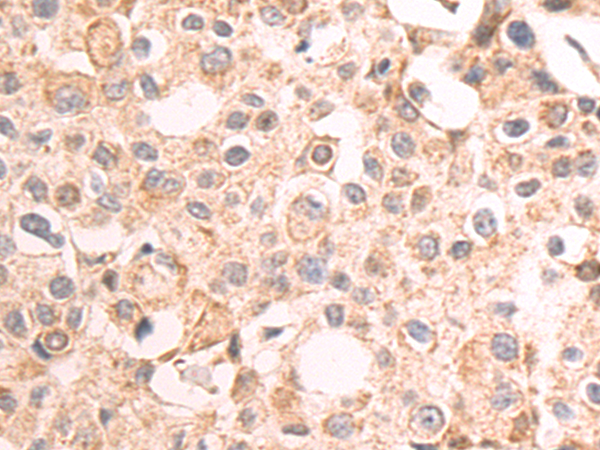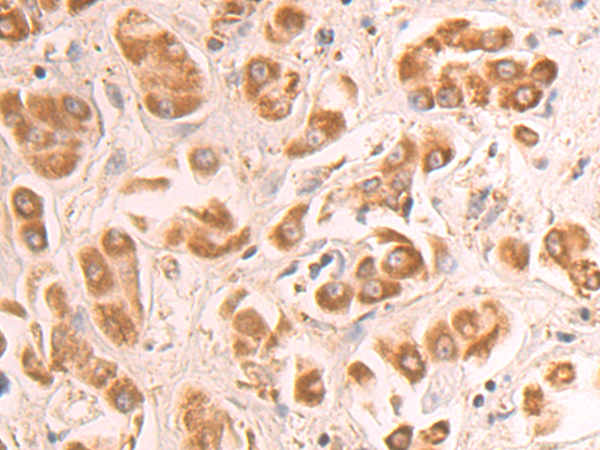

| WB | 咨询技术 | Human,Mouse,Rat |
| IF | 咨询技术 | Human,Mouse,Rat |
| IHC | 1/50-1/200 | Human,Mouse,Rat |
| ICC | 技术咨询 | Human,Mouse,Rat |
| FCM | 咨询技术 | Human,Mouse,Rat |
| Elisa | 1/5000-1/10000 | Human,Mouse,Rat |
| Aliases | BARK2; ADRBK2 |
| Host/Isotype | Rabbit IgG |
| Antibody Type | Primary antibody |
| Storage | Store at 4°C short term. Aliquot and store at -20°C long term. Avoid freeze/thaw cycles. |
| Species Reactivity | Human, Rat |
| Immunogen | Fusion protein of human GRK3 |
| Formulation | Purified antibody in PBS with 0.05% sodium azide and 50% glycerol. |
+ +
以下是关于GRK3抗体的3篇参考文献及其摘要概括:
---
1. **文献名称**:*"G protein-coupled receptor kinase 3 (GRK3) regulates opioid receptor signaling in the dorsal root ganglia"*
**作者**:Wang et al. (2018)
**摘要**:该研究通过Western blot和免疫组化技术,使用特异性GRK3抗体验证了其在背根神经节神经元中的表达,发现GRK3通过调控μ-阿片受体的活性影响疼痛信号传导。
---
2. **文献名称**:*"GRK3 deficiency enhances chemokine receptor signaling and promotes melanoma progression"*
**作者**:Chen et al. (2020)
**摘要**:作者利用GRK3抗体检测肿瘤组织中GRK3蛋白水平,发现其低表达与黑色素瘤转移增强相关,表明GRK3通过抑制趋化因子受体CXCR2信号通路抑制肿瘤侵袭。
---
3. **文献名称**:*"Antibody-based analysis of GRK3 in bipolar disorder and schizophrenia postmortem brains"*
**作者**:Niculescu et al. (2016)
**摘要**:研究通过GRK3特异性抗体对精神疾病患者脑组织进行检测,发现双相情感障碍患者前额叶皮层中GRK3表达显著降低,提示其可能参与情绪调节通路的异常。
---
如需具体文献链接或更多信息,建议通过PubMed或Google Scholar搜索标题或作者名获取全文。
GRK3 (G protein-coupled receptor kinase 3), also known as ADRBK2. is a member of the GRK family that regulates signaling of G protein-coupled receptors (GPCRs). It phosphorylates activated GPCRs, promoting receptor desensitization, internalization, and downstream signaling modulation. Primarily expressed in the brain, cardiovascular system, and immune cells, GRK3 plays roles in neurotransmission, cardiac function, and inflammatory responses. Dysregulation of GRK3 is implicated in various pathologies, including bipolar disorder, heart failure, hypertension, and cancer. For instance, reduced GRK3 levels in the prefrontal cortex are linked to mood disorders, while its overexpression in tumors may influence cell proliferation and metastasis.
GRK3 antibodies are essential tools for studying these mechanisms. They are widely used in techniques like Western blotting, immunohistochemistry, and flow cytometry to quantify protein expression, assess localization, and explore interactions in cellular or tissue samples. Commercially available GRK3 antibodies are typically raised against specific epitopes (e.g., C-terminal regions) and validated for species cross-reactivity (human, mouse, rat). Researchers rely on these antibodies to investigate GRK3’s role in disease models, drug discovery, and signaling pathway analyses. However, variability in antibody specificity requires careful validation via knockout controls or peptide blocking to ensure accurate results. Overall, GRK3 antibodies are critical for advancing insights into GPCR-related physiology and therapeutic targeting.
×